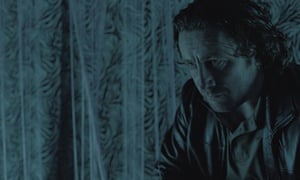
“You’d think that policemen like Michael Logan wouldn’t exist. They exist because they’re good at their job. They do good work and they become untouchable. But this isn’t the ‘eighties; if we don’t stop scum like that now, we’ll end up working for them.”
This isn’t the eighties. So says Nick Taylor (Richard Dormer), the internal affairs agent tasked with bringing down Michael Logan (Peter Ferdinando), HYENA’s heir apparent to the American bad lieutenant. As a cop with an impressive arrest record, Logan operates with limited oversight from his commanding officer. He and his vice squad – comprised of men more brutal and less intelligent than himself – bang heads without grand ambitions, making deals with the mobsters they think they can control, arresting the ones who pose a threat. Logan lies, steals, and snorts his way through every layer of the British underworld, and HYENA never misses the opportunity to remind us that all of this is possible due to his skills as a police. Logan is a good cop. He’s a fine officer.
Why show us Logan’s skills when you can just tell us, again and again?

No, this might not be the eighties, but it sure as hell is inspired by it. From the neon blue title card to the soundtrack by underground eighties band The The, HYENA holds up aspects of the neo-noir for examination. In fact, Gerard Johnson’s film seems to exist in two separate versions of the decade. There are the visuals and moral ambiguity inspired directly by filmmakers such as Abel Ferrara and Michael Mann – what Bilge Ebiri refers to as the “poetic existentialism of his outlaw characters” in his ode to Mann’s THIEF – but there is also the contemporary rediscovery of eighties visuals and color schemes, the modern neo-neo-noir (if you will) that tries to place a decade of “outlaw existentialism” into the language of the modern arthouse film. Only a film this steeped in its own history could boldly make the claim that the eighties no longer exist. HYENA enjoys its influences too much to ever really escape them.

All of which may make it sound like HYENA is some exercise in popular aesthetics, which isn’t quite true. The film takes well-worn territory and untethers itself due to its central character study. Gerard Johnson knows full-well the talent he has in Peter Ferdinando; each of the four credits to his name – including two short films – have featured the actor in the leading role. Ferdinando plays Logan as a man devoid not of conscience, but of une raison d’être. His one great goal in life is to invest in a drug route in the Middle East, but when ownership of this route is taken over by a pair of violent brothers, Logan simply alters his plan to account for the new ownership. For all his skimming and dealing, Logan barely keeps his head above water. He may be crooked, but he is not an ambitious crook, staying just around the break-even point for his meager lifestyle. Ferdinando has Logan constantly stooped over and adjusting his strands of hair, making each little victory seem like a valiant effort on his behalf.
Like many noir and neo-noir before it, HYENA also brings Logan into contact with a sex worker who he hopes to save. Unlike many of these films, though, HYENA does not use the damsel in distress as a redemptive storyline for its lead. The film implies the grander scale of sex trafficking, where Ariana (Elisa Lasowski) exists as one piece of a complex and horrible machine. Ariana’s escape means that horrible things will happen to her loved ones; she eventually comes to see her own cry for help as a selfish act, indicating a complicated scale of power and powerlessness that cannot be solved through gunfire or fisticuffs. The New York of eighties crime films may be a universe in-and-of-itself, but the London of HYENA is connected to the rest of the world. Cultures clash and collide, the line between sadism and business become blurred, and Logan finds himself digging a hole with no prayer of ever crawling out.

If HYENA truly diverges from the eighties – if the film diverges from its own monologue on the need for reform – it is that the film is unafraid to show its characters own irrelevance on the grander scale. There is no personal development in the film, no true chance at redemption. This film is not destined to end with a gunshot in a car or a return to the beginning; this is a film that shows crime as a perpetual motion machine, and the most that good and bad men can do is cling to the cogs for dear life and hope to stay on. This nihilistic bent to HYENA makes is far more compelling than many of its pseudo-eighties contemporaries. For any of its flaws in terms of narrative tightness, this allows the film to find its way to the rare perfect ending, a final scene that perfectly summarizes even as it points to an uncertain future.

Global, autonomous crime. What chance does a crooked cop have in a world like this?
— MATTHEW MONAGLE.
- [THE BIG QUESTION] WHAT’S YOUR FAVORITE FEMALE ENSEMBLE IN MOVIES? - July 22, 2016
- [IN THEATERS NOW] THE BOY (2016) - January 24, 2016
- Cult Movie Mania Releases Lucio Fulci Limited Edition VHS Sets - January 5, 2016
Tags: abel ferrara, Crime, Drugs, Elisa Lasowski, Film Reviews, Gangs, Gerard Johnson, Matthew Monagle, Michael Mann, Neo-Noir, Peter Ferdinando, Richard Dormer, Stephen Graham, The The, Tribeca Film Festival






No Comments